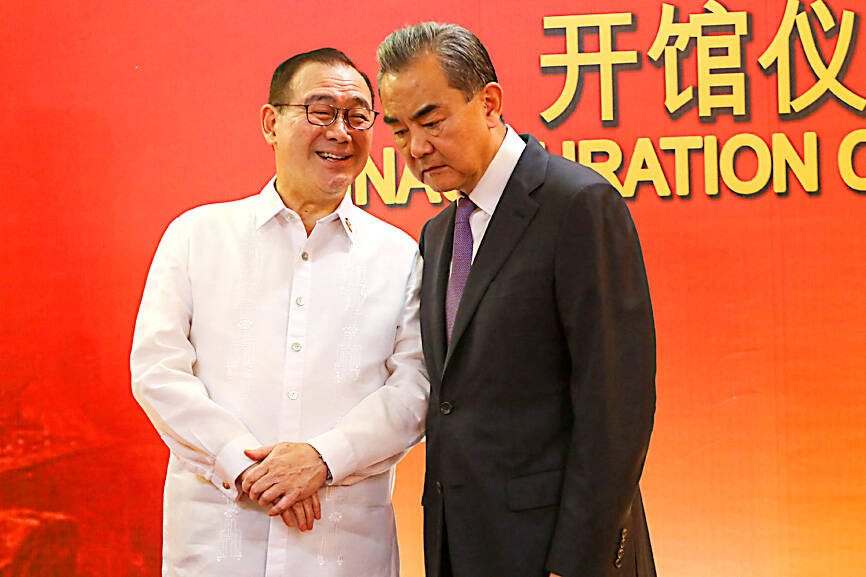Former Philippine secretary of foreign affairs Teodoro Locsin has been appointed the president’s special envoy to Beijing, the government said yesterday, despite the outspoken diplomat’s profanity-laced criticism of China.
Locsin, currently the ambassador to Britain and Ireland, often used strong language while serving as foreign secretary under former Philippine president Rodrigo Duterte, and once swore at China online over the presence of its vessels in the disputed South China Sea.
“China, my friend, how politely can I put it? Let me see... O... GET THE FUCK OUT,” Locsin posted on Twitter in May 2021.

Photo: AFP
Locsin also likened China to “an ugly oaf forcing your attentions on a handsome guy who wants to be a friend.”
His expletive-laden demand prompted a rebuke from Beijing and Locsin later apologized to his Chinese counterpart.
The Philippine Department of Foreign Affairs declined to comment on Locsin’s surprise appointment, which was announced by the Presidential Communications Office on Facebook.
It said in a brief statement that Locsin had been appointed “Special Envoy of the President to the People’s Republic of China for Special Concerns.”
No other details were provided.
Presidential Communications Office Secretary Cheloy Garafil told reporters that Locsin would serve in a “concurrent capacity,” suggesting he would remain as ambassador.
Locsin is a prolific poster on the platform X, formerly known as Twitter, on topics ranging from Holocaust victims to his late pet cat, but has not commented publicly on his appointment.
The decision comes at a delicate time for relations between the Philippines and China, which are embroiled in another diplomatic spat over the South China Sea. Beijing claims almost all of the waterway, through which trillions of dollars in trade passes annually, and has ignored a 2016 international court ruling that its assertion has no legal basis.
Tensions flared this month when the Philippines accused China Coast Guard vessels of blocking and firing water cannons at boats on a resupply mission.
Manila summoned Beijing’s envoy over the incident, which resulted in one of the boats carrying supplies failing to reach a Philippine Navy vessel grounded on the Second Thomas Shoal (Renai Shoal, 仁愛暗沙), which Taiwan also claims.
The handful of Filipino marines stationed on the crumbling ship to assert the Philippines’ territorial claims depend upon resupply missions to survive their remote posting.
Beijing has defended its actions as “professional,” and accused Manila of “illegal delivery of construction materials” to the grounded ship.

The CIA has a message for Chinese government officials worried about their place in Chinese President Xi Jinping’s (習近平) government: Come work with us. The agency released two Mandarin-language videos on social media on Thursday inviting disgruntled officials to contact the CIA. The recruitment videos posted on YouTube and X racked up more than 5 million views combined in their first day. The outreach comes as CIA Director John Ratcliffe has vowed to boost the agency’s use of intelligence from human sources and its focus on China, which has recently targeted US officials with its own espionage operations. The videos are “aimed at

STEADFAST FRIEND: The bills encourage increased Taiwan-US engagement and address China’s distortion of UN Resolution 2758 to isolate Taiwan internationally The Presidential Office yesterday thanked the US House of Representatives for unanimously passing two Taiwan-related bills highlighting its solid support for Taiwan’s democracy and global participation, and for deepening bilateral relations. One of the bills, the Taiwan Assurance Implementation Act, requires the US Department of State to periodically review its guidelines for engagement with Taiwan, and report to the US Congress on the guidelines and plans to lift self-imposed limitations on US-Taiwan engagement. The other bill is the Taiwan International Solidarity Act, which clarifies that UN Resolution 2758 does not address the issue of the representation of Taiwan or its people in

US Indo-Pacific Commander Admiral Samuel Paparo on Friday expressed concern over the rate at which China is diversifying its military exercises, the Financial Times (FT) reported on Saturday. “The rates of change on the depth and breadth of their exercises is the one non-linear effect that I’ve seen in the last year that wakes me up at night or keeps me up at night,” Paparo was quoted by FT as saying while attending the annual Sedona Forum at the McCain Institute in Arizona. Paparo also expressed concern over the speed with which China was expanding its military. While the US

SHIFT: Taiwan’s better-than-expected first-quarter GDP and signs of weakness in the US have driven global capital back to emerging markets, the central bank head said The central bank yesterday blamed market speculation for the steep rise in the local currency, and urged exporters and financial institutions to stay calm and stop panic sell-offs to avoid hurting their own profitability. The nation’s top monetary policymaker said that it would step in, if necessary, to maintain order and stability in the foreign exchange market. The remarks came as the NT dollar yesterday closed up NT$0.919 to NT$30.145 against the US dollar in Taipei trading, after rising as high as NT$29.59 in intraday trading. The local currency has surged 5.85 percent against the greenback over the past two sessions, central